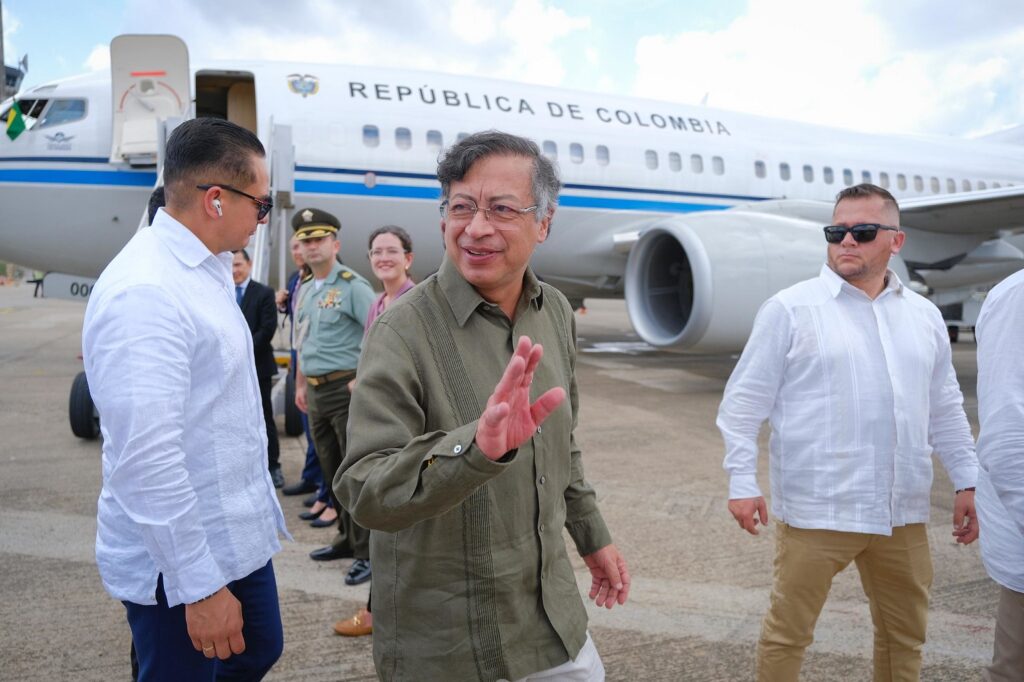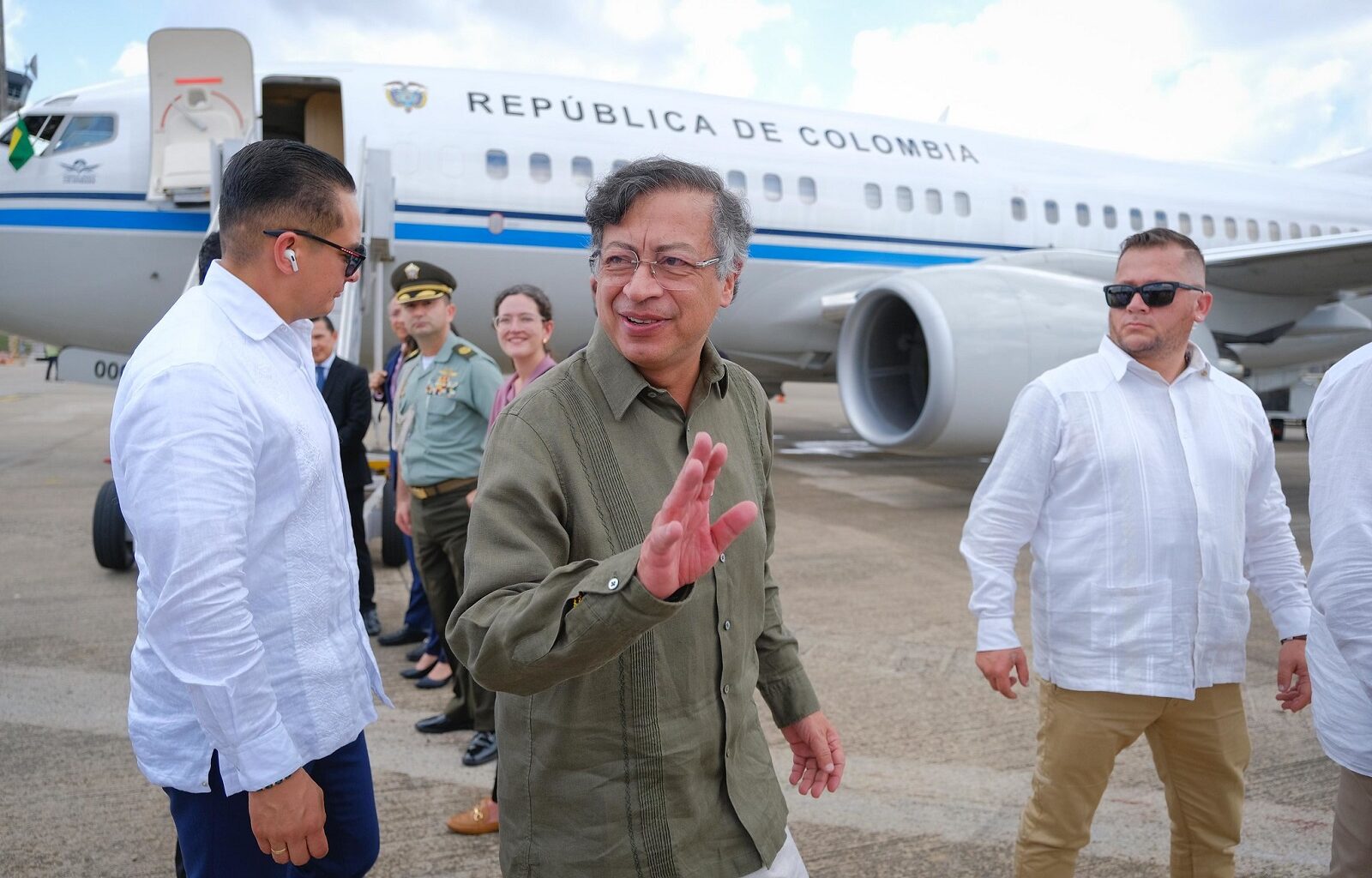
Colombia’s Petro clarified that the conflict over fuel supplies for the presidential plane occurred in Cape Verde, with a U.S. company. Credit: Ovidio González / Presidency of Colombia.
Amid a diplomatic tour of the Middle East, Colombian President Gustavo Petro responded to reports claiming that the Spanish government had refused to refuel the Colombian presidential plane, clarifying that the incident occurred elsewhere and was caused by a U.S. company contracted by the Colombian Air Force (FAC).
Petro said that during his trip earlier this week to Saudi Arabia, the plane did not stop in Spain, as was reported this morning, but in Cape Verde, where the Colombian state had contracted fuel supply services with a U.S.-owned company that, in violation of the contract and in light of Petro’s recent inclusion in the Clinton List by the United States, refused to comply with the agreements made with Colombia.
In a social media post, Petro highlighted Spain’s role as a problem-solver in the situation caused by the U.S. company’s refusal in Cape Verde, and not as the source of the problem. With this, the Colombian president sought to acknowledge the efforts of a friendly nation and an ideological ally.
Colombia’s Petro denies Spain blocked fuel for presidential plane, blames US firm in Cape Verde
According to initial reports, the Colombian presidential flight had made a stopover in Madrid (Spain) before continuing on to Saudi Arabia, Egypt, and Qatar, and at that point had allegedly been unable to refuel due to Petro’s recent inclusion in the so-called Clinton List of the U.S. Office of Foreign Assets Control (OFAC).
Several Colombian media outlets suggested that U.S.-owned fuel companies operating at the Madrid airfield refused to supply fuel over legal concerns, and that it was ultimately the Spanish government that provided fuel to the Colombian presidential plane at an airfield near Barajas Airport. However, Petro maintained that the account placing Spain at the center of the incident was false.
“The humiliation did not happen at Madrid airport — stop spreading lies. It was the American company with which FAC [the Colombian Air Force] contracted all its fuel abroad, something that should have never happened, and the place was Cape Verde, in Africa. Spain helped me, on the contrary,” he wrote on his X social media account.
After announcing that Colombia would terminate its commercial contract with the U.S. firm, Petro went on to once again criticize President Trump, with whom he has deep differences that have intensified in recent weeks.
“The world knows that Trump is persecuting me because I opposed the genocide in Gaza and the crimes in the Caribbean — not because I carried cocaine, or because I had a mobster niece or sister-in-law, or uncle, or because I was in Pablo Escobar’s cartel with a friend’s father from the Ochoa family and things like that,” he said.
La humillación no la pusieron en el aeropuerto de Madrid, no digan más mentiras.
Fue la empresa norteamericana con la que la FAC contrato toda su gasolina fuera del país, cosa que nunca debió ocurrir, y el lugar fue Cabo Verde en el África. España me ayudó, al contrario.
Menos… https://t.co/IRVgR81cV8
— Gustavo Petro (@petrogustavo) October 30, 2025
Spain is an ally of the Colombian government
The specific episode highlights how U.S. sanctions can have operational effects on the international movements of a head of state. Although the aircraft is owned by the Colombian government, fuel contracts and international suppliers are subject to the U.S. sanctions regime. Thus, an apparently simple logistical process — a technical stop for refueling — can become a potential point of diplomatic friction and logistical vulnerability.
From a diplomatic standpoint, the incident creates tensions between Bogota and Washington, while also involving secondary allies such as Spain, whose role was reinterpreted by the president to dissociate it from any obstacle and instead present it as cooperative.
It is worth recalling that, unlike what happens with Trump, Petro maintains good relations with the Spanish government of President Pedro Sanchez, with whom he shares ideological and strategic affinities.
From now on, and as sources from the presidency acknowledge, the Colombian government faces the challenge of “redefining flight routes, suppliers, and partnerships to ensure that similar incidents do not occur again.” It will also have to clarify the processes for contracting international fuel and the legal risks involved to avoid stoppages or delays that could affect the president’s international activities.

Petro sought to clarify the role of Pedro Sánchez’s government in Spain in the conflict over the presidential plane, making it clear that the European country is one of his main allies in the international context. Credit: La Moncloa.
